November/December 2017
Happy Holidays from the Princeton in Africa office! We had another fantastic year as we transitioned between the 2016-17 and the 2017-18 fellowship classe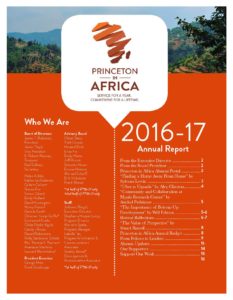 s. I encourage all of you to check our our 2016-17 Annual Report to learn more about the achievements of last year’s Fellows, host organizations and alumni, and to read through some of the exciting work of our current cohort in the stories below.
s. I encourage all of you to check our our 2016-17 Annual Report to learn more about the achievements of last year’s Fellows, host organizations and alumni, and to read through some of the exciting work of our current cohort in the stories below.
PiAf Connections
Please click below to check out pictures of our Fellows, Alums and other members of the PiAf family meeting up at home and around Africa.
Attachments
Notes from the Field
By Nicole Dagata, 2017-18 Fellow with Clinton Health Access Initiative in Swaziland
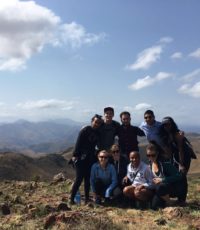
Princeton in Africa South Africa and Swaziland Fellows enjoying spectacular Swaziland mountains on a hike in Matsapha.
My entire life, I have always answered this very popular question the same way.
“What do you do?”
While the job/internship/volunteer positions may have changed over the years, I nonetheless continued to answer with my job title. I put so much emphasis on these labels that I started to let it dictate how I defined myself. Oftentimes, I let it impact my self-worth and constantly worried about where and how far that title would propel me in my career. This year working for CHAI Swaziland is, in fact, the best job I’ve ever had. It challenges me in the best ways, allows me to deeply explore the HIV space throughout the country, and provides the opportunity to work with brilliant minds from all around the globe to create meaningful change. Despite my love and admiration for what I do and how much I adore coming to work every day, I am determined to not let it delimit who I am.
This is not to say that hobbies and interests outside of work have been nonexistent in my life. But rather, none of these interests earned any meaningful status from myself. No matter how much I love learning new languages, rocking out on a bike to my favorite music, or learning to make exciting new meals, these parts of my life always took a very significant backseat to my job. And jobs are important, especially to someone like me who is very passionate about my career. However, these other parts of my life are special as well and essential to living a life of joy as I have come to find. My epiphany moment reared its head when for a brief period (though it seemed like an eternity at the time) my fellowship opportunity was placed on hold due to visa issues with my original host country. In this moment, my life actually crumbled. The only metric with which I measured myself, my precious defining characteristic, was ripped away and it suddenly felt that I was no longer living a successful, fulfilling life.
In the end, I emerged with a fantastic job with the CHAI Swaziland office and with a renewed inspiration to find balance in my life. I immediately signed up for a number of extracurricular activities that emphasized other aspects of life I hold dear. I view each activity as an essential part of my daily routine and make sure to take sufficient time for each one. Of course, I’m still trying to balance this amongst a busy and demanding work schedule, but that is a normal part of this wonderful journey and I am more than happy to learn, make mistakes, grow, and live along the way.
“So, Nicole, what do you do?”
Well, I’m on a swim team. A cycle enthusiast. A musician. A French student. I’m a pretty solid cook. And I am a data analyst for an HIV test and treatment project. I am each one and I am all.
Notes from the Field
By Tomas Husted, 2017-18 Fellow with International Rescue Committee in Sierra Leone
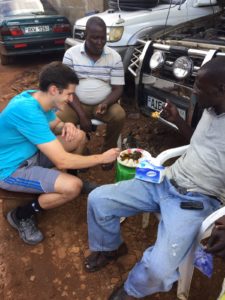
Tomas shares a plate of crain crain with fufu with his neighbors Leslie (L) and Momodu (R).
A 40oz jar of Jif Creamy Peanut Butter from St. Mary’s supermarket in Freetown, Sierra Leone, runs you 120,000 Leones ($16)—fully half of my weekly grocery budget. That’s not just steep; it’s criminal. And unfortunately I’m ready prey for this extortion, as a proud member of that class of patriots that refuses to accept the revisionism about peanut butter’s provenance. As I learned in school, sometime after Paul Bunyan carved out the Grand Canyon and Johnny Appleseed brought us the pomme de terre, a great American named George Washington Carver roasted some peanuts and then accidentally churned them, or something. Peanut butter is as red, white, and blue as it gets; if it’s not U.S.-brand butter, I’m not buying. So it is with sadness that I now report that, with the bills mounting, I’ve had to leave the stuff on the shelf—and with it, a reminder of home.
To travelers, the kitchen is often billed as a sort of fortress against homesickness: if you’re feeling down, just whip up your favorite dish from back home and you’ll be good as new. Setting aside how cruelly despairing this prescription can be for us less capable chefs—I have, on more than one occasion, dumped a can of kidney beans over a pile of rice in a failed effort to evoke my mom’s lentil recipe and conjure the restorative properties of home-cooking—I’m now prepared to disagree on more substantive grounds. During my three months in Sierra Leone, I’ve felt most at home when sitting with friends, digging into a dish I’d be hard-pressed to find back in Chevy Chase, Maryland.
Of course, for seasoned travelers, this is old news. The ability of food to “bring people together” is a cliché on the order of “been there, done that, got a T-shirt.” Yet as someone who’s never lived abroad, I’ve been amazed by the extent to which these shared experiences have helped me to settle in. They’ve often been pleasant, as in my role as the self-appointed judge of the office competition between my East African colleagues over whose country produces the best coffee—a contest from which, as a coffee lover with no national pride on the line, I’ve emerged as the clear winner. A few have been near-fatal, like my encounter with Akabanga, a chili sauce my Rwandan friend brought back after a trip home.
Still others have verged on the spiritual. Around my three-month mark, my neighbor Mariama found out that I’d never had cassava leaf, a staple of Sierra Leonean cuisine. Visibly appalled, she took it upon herself to fix me a plate, spending close to a full day’s salary on the “good fish”—nothing less would do for my first taste. And so it was that on a drizzly Wednesday in early October in Freetown, Sierra Leone, laughing with Mariama and her daughter, Natu, over a steaming plate of cassava leaf with fish, this peanut butter-loving American felt strangely, wonderfully, home.
Notes from the Field
By Jake Lockledge, 2017-18 Fellow with Population Services International in Tanzania
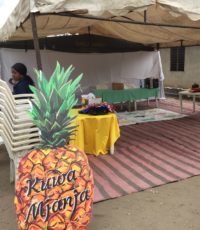
A Kuwa Mjanja pop-up event with brand signs and tent set up.
My first week at Population Services International/Tanzania (PSI/TZ) ended with the privilege of attending a Kuwa Mjanja pop-up event. Kuwa Mjanja (“Be Smart”) is the new brand under PSI/TZ’s Adolescents 360 (A360) program. A360 aims to increase modern contraceptive use among young girls aged 15-19 and reduce unintended pregnancy. Kuwa Mjanja is a brand catered towards adolescent girls and their challenges and aspirations.
KM pop-up events are simply a tent, brand signs and some dedicated volunteers. For the adolescent girls attending, we had various resources: a volunteer craftsman from the community teaching the art of cloth stamping, counselors to speak one-on-one with attendees about their achieving their dreams and where family planning fits in, and providers to administer contraceptives if desired.
It was truly exciting to witness empowerment in action. Girls with oftentimes very little agency in their daily lives chose to learn more about how they could achieve their dreams by making their own decisions about their own bodies. Even though contraception is a socially taboo subject for adolescent girls in Tanzania, I watched Kuwa Mjanja make it approachable and relevant.
I was also excited by the motivation for our organization to keep developing. On the ride back from the event, my colleagues and I discussed ways to improve aspects of the event like the waiting area and the skills building session. At PSI/TZ I’ve seen us ask plenty of How Might We questions:
How might we design the waiting area so attendees aren’t nervously awaiting their counseling session?
How might we improve the skills building session so attendees leave with more than one skill they may or may not use again?
I learned that day that working at PSI will have a measurable impact, and we will always be thinking of ways to improve lives. My work here will specifically focus on supporting the A360 program with a three pronged project. The first part is an update to our current eReferral system, so we’re able to refer girls to events like the KM pop-up event. We will also be creating a tablet-based tool our interpersonal communicators (IPC) will use when counseling young girls about ASRH and modern contraception. Finally, we will construct a feedback loop to track our adolescent clients’ satisfaction and ways we can make our IPCs and providers more youth-friendly. Every day offers a new opportunity to learn and progress, and I can’t wait to continue working.
Speaking of learning opportunities, I’ve been taking Swahili lessons with arguably the most popular Swahili teacher in Dar: Sayi Michael. I think it’s coming along nicely, but every class we start by discussing some tough issues. So far topics have included censorship, gender inequality, morality, and the existence of God. Finally, my philosophy minor is paying off.
Notes from the Field
By Megan Madeira, 2017-18 Fellow with Resonate in Rwanda
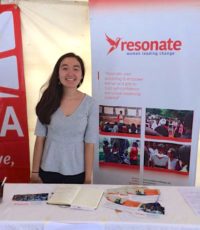
Megan representing Resonate at a career fair for young women in Kigali.
My transition this year from pupil to practitioner of international development has been taxing, to say the least. As a student, I got to criticize and judge international development professionals and ask critical questions about the fundamental issues that afflict this field. But now as a Princeton in Africa Fellow, I have to answer and act upon some of the very questions I had as an undergrad. I’ve had to move from studying development policies and theories in Washington, D.C., to analyzing the realities on the ground in Kigali, which are much more complicated and rooted in a local context. I’m still learning to be motivated, rather than paralyzed, by questions surrounding power structures, the legacy of colonialism, and what “development” even means.
As I struggle to justify my position in this field and contemplate where my talents and passions lie, the work of my fellowship organization just makes perfect sense. At Resonate, we are pioneering a new approach to tackling gender inequality. The heart of our work is to unlock the confidence and leadership potential in women and girls in East Africa. We partner with organizations providing education or vocational skills. We integrate our workshops into their programs so that women and girls not only have hard skills, but also the self-confidence and communication skills to realize their fullest potential.
As a communications and development Fellow, I get to listen to and amplify the voices of the women and girls we work with for fundraising and thought leadership purposes. The best part of my work is witnessing the increases in confidence and self-efficacy from our workshops. Human-centered design is a big part of our work; our programs are designed with and for women and girls. We recently got to work with a team from Google, where we prototyped new ways to scale and engage boys in our work. I will never forget interviewing high-school student Diane*. She looked at me with excited, wide eyes as she said, “Resonate’s training taught me that opportunities won’t come to me, but that I can go and get them myself. And I will carry that with me for the rest of my life.”
Like Diane, I personally find our approach inspiring. From imposter syndrome, to women attributing their success to luck, to the burnout that comes with trying to be perfect, to risk aversion, to classrooms where only boys contribute despite being the minority, there is so much empirical evidence of a gendered confidence gap. Our ultimate goal is that the international community will incorporate self-confidence and aspirations into development solutions.
Although I’m still transitioning from pupil to practitioner, I’m also bridging the gaps. My friend likened our work to the top of Maslow’s hierarchy of needs, self-actualization. Moreover, I think our work actualizes the words of one of my favorite development theorists, Amartya Sen, who maintained that, “Freedoms are not only the primary ends of development, they are also among its principal means.”
*Name changed for privacy purposes
Notes from the Field
By Emily Stolfus, 2017-18 Fellow with Maru-a-Pula in Botswana
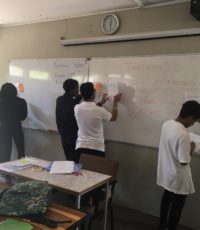
Who wants to do test review sitting down when you could be up and moving instead?
If I were asked to sum up my teaching experience at Maru-a-Pula in one word, I would choose “energy.” Whether that’s the energy needed to make it out of bed and to the staff meeting by 6:55am, the adrenaline rush that comes with teaching a successful lesson, or the endless energy that flows from a room full of teenagers, energy is key to surviving and thriving at MaP.
A large portion of my daily energy is spent teaching Form 1 and 3 (7th and 9th grade) geography classes. I am constantly challenged not only to learn new material myself but also to find a way to make the information relevant and interactive for my students. Some of my favorite (read: most energy draining yet also most energy giving) lessons have included a bean bag toss game to learn about grid references, a massive three-day-long centers rotation on mapping skills, and a Socratic Seminar to discuss agriculture development, and a courtroom style debate on essential settlement resources.
Still, geography only accounts for about half of my teaching responsibilities. I am also teaching two sections of Life Orientation, which focuses on helping Form 1 students talk through different issues such as race, identity, conflict management, and values. We have paired up with classrooms in the US to incorporate a cultural exchange into our discussions. The students get very excited to tell others about their experiences in Botswana, and it’s really interesting to see what they consider valuable information (everything from describing seswaa – a traditional beef dish – to reiterating that there are many sides to Africa, not just poverty).
Additionally, I teach weekly English Catch Up classes, which essentially are afterschool tutorials. My group consists of 14 Form 1 boys and 3 Form 1 girls, and we are certainly an active bunch. Since the goal of the class is to increase language comprehension, I start each lesson with puns. This has turned out to be a great way to share a laugh, build rapport, and also discuss nuances of the English language all at the same time. It also led to an entire cake-themed lesson thanks to our analysis of the idiom “it’s a piece of cake.” Side note, it seems that regardless of location, cake is always the way to win over a group of teenagers.
Some of my other main responsibilities here include assisting in a weekly yoga class for students, sponsoring a board games club, covering lessons/co-curriculars for various teachers when they need time off, and, recently, coordinating a tutoring program between MaP students and children at a local primary school.
Whew. Just reading over all of that makes me tired. But, it also makes me quite excited. Not a single day here is the same, and I wake up each morning feeling excited for all of the opportunities ahead. The buzz of 800 people collectively investing in the future certainly creates a force to be reckoned with.
Notes from the Field
By Avukile Zoya, 2017-18 Fellow with Baylor International Pediatric AIDS Initiative in Botswana
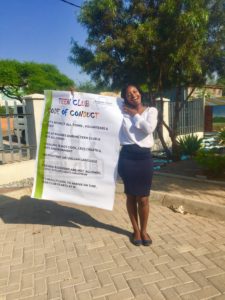
Avukile at the Adolescent Centre just after having a Teen Club Session.
OZZI OZZI … OIY OIY. OIY OIY… OZZI OZZI!!!!
Those were the chants that filled the hallways, the playrooms and the dining halls during our Weekend Camp in the month of September. Camp was one of the special projects I got to work on as a Program and Activities coordinator which Botswana Baylor was piloting with the SeriousFun Children’s Network. The camp was meant for teens that were not adhering well to treatment and those who had psychosocial issues. They nurtured their inner children, whilst simultaneously bonding through activities that focused on creating a space for communication, vulnerability and trust. It was certainly a big learning lesson for me professionally as it taught me about the importance of flexibility when planning large events as well as how to make activities adaptable to different age groups. It taught me the importance of communication when working with a team, and it taught me about leadership and how it is embroidered in listening, guiding, being present and in constantly asking “how can I help you?” It was truly a successful weekend, filled with so much laughter, cheers and many lessons.
My daily projects include organizing our monthly Teen Club sessions, overseeing the tutoring, design squad and volunteer program. Teen Club, our biggest program every month, is like a support group for the teens that allows them to gather with and meet other HIV positive peers who are experiencing many of the same difficulties. It acts as a safe space for the teens to play educational games, learn about their health challenges and form strong bonds between one another. For the past three months working at Baylor, we have engaged teens in themes such as Adherence, Physical activity & Nutrition and Gender. Now we are preparing to have a Creative Arts Career Fair and bringing in professionals in fashion designing, sculpting, vlogging, live painting and much more. This is in the hope that they may come to share with the teens and inspire them through their experiences.
Before I moved to Botswana, Gaborone, I was filled with lots of excitement and bits of nervousness and uncertainty for what to expect. But three months into my fellowship, I began to embrace moments of unpredictability, such as the random dance sessions in the office with my colleagues, the weekends spent playing charades and bananagrams, and the deep political conversations with the locals. With time, the houses of my friends began to feel like my own – the atmosphere was filled with the smell of seswaa meat and chakalaka, sprinkled with traditional musical sounds, had nearby food markets, marathons, picnics and brunches, and most importantly, warm smiles, hugs and generous hearts from the adolescents I interact with. It was in these moments I realized I should have never worried. Being a Botswana BIPAI, PiAf Fellow has been an eye opening, challenging and enriching experience. At this moment in time, there’s no place I’d rather be.
Notes from the Field
Alumni Update: Hilary Robinson & the Alumni Giving Campaign
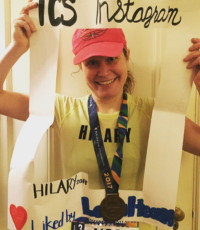
Hilary after finishing the New York City Marathon on November 5, 2017
The Princeton in Africa community is built from the support of our amazing alumni. A special shout out to Hilary Robinson, 2007-08 Fellow with Plan International in Uganda, who kicked-off this year’s Alumni Giving Campaign by running the New York City Marathon and raising $856. Hilary’s fundraising efforts were inspired by the positive impact of her fellowship year. She states on her fundraiser page, “My fellowship year with PiAf was among the most enriching of my life, and I am passionate about ensuring others have the same opportunity.”
Hilary is only one of our supportive alumni in our network of almost 500 young professionals. As we do at the end of every year, we ask for the support from our alumni to help strengthen Fellow/alumni relationships. We hope you consider donating to the 2017 Alumni Giving Campaign.





